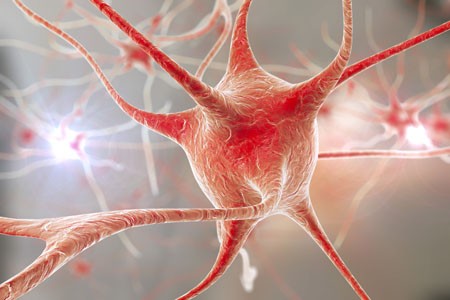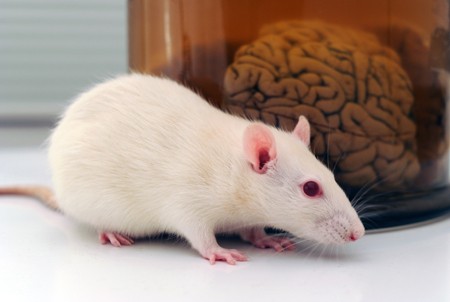Over-Pruning of Synapses May Explain Schizophrenia
A gene that plays a role in the pruning of synapses has been linked to schizophrenia. The gene encodes an immune protein called complement component 4 (C4), which may mediate the pruning of synapses, the connections between neurons. Researchers led by Aswin Sekar found that in mice, C4 was responsible for the elimination of synapses. The team linked gene variants that lead to more production of C4A proteins to excessive pruning of synapses during adolescence, the period during which schizophrenia symptoms typically appear. This may explain why the brains of people with schizophrenia have fewer neural connections. The researchers hope that future therapies may target the genetic roots of the illness rather than simply treating its symptoms.
Long-Acting Injectable Aripiprazole Approved for Schizophrenia
 In October, the US Food and Drug Administration (FDA) approved an injectable, long-acting version of the atypical antipsychotic aripiprazole for the treatment of adults with schizophrenia.
In October, the US Food and Drug Administration (FDA) approved an injectable, long-acting version of the atypical antipsychotic aripiprazole for the treatment of adults with schizophrenia.
The long-acting aripiprazole is administered every 4 to 6 weeks as an injection in the arm or buttocks. The company announced that it would begin releasing the drug immediately. The drug preparation for maintenance treatment is named Maintena while the preparation for acute treatment is named Aristada.
Alzheimer’s Treatments May Work for Memory Dysfunction in Depression
In a recent BNN article on potential drugs for memory loss, we omitted two conventional classes of drugs used to treat Alzheimer’s Disease—acetylcholine esterase inhibitors (AChE-Is) and the blocker of glutamate NMDA receptors memantine (Namenda). This was intentional, as we hoped to suggest possible approaches prior to the use of these drugs for full-blown dementia. However, we neglected to cite a 1999 study by Fred Jacobsen in the Journal of Clinical Psychiatry that indicated that the AChE-I drug donepezil (Aricept) was effective in improving drug-induced memory dysfunction in patients without dementia. Side effects included insomnia, nausea, vomiting, and diarrhea.
Jacobsen has used AChE-Is to improve memory in over 80 patients with unipolar or bipolar depression, aged 19-85. In a 2016 personal communication to the BNN, he indicated that doses of 5mg/day are typically enough to improve memory. Higher doses of 10mg/day may be more effective, but increase the risk of switching into mania for patients with bipolar depression. Some of Jacobsen’s patients have used AChE-I drugs for 10–15 years without the drugs losing effectiveness. For some patients, Jacobsen has switched from prescribing donezepil to prescribing rivastigmine (Exelon or Exelon patch), which he finds they can more easily tolerate.
We should also remind readers of the BNN of our previous report on memantine (Namenda) for bipolar depressed patients with cognitive impairment. We wrote, “In an abstract presented at the 67th Annual Meeting of the Society of Biological Psychiatry in 2012, Dan V. Iosifescu reported that in a randomized 12-week study in which the anti-Alzheimer’s drug memantine was given to 72 euthymic bipolar subjects experiencing cognitive deficits, the drug was associated with improvement in spatial and working memory, verbal and episodic memory, and other indices that included measurements of attention and language skills. In conjunction with this treatment, a subgroup of subjects had increases in left hippocampal NAA (a measure of neuronal viability) and increases in choline in the right hippocampus. The initial improvements in these neuropsychological test results remained over 12 weeks of open follow-up.”
In an earlier proof-of-concept study published in the journal CNS Neuroscience and Therapeutics in 2009, Iosifescu had also reported that among nineteen subjects with bipolar disorder that was in remission, but who had residual cognitive deficits, open-label treatment with the AChE-I galantamine (extended release) at doses of 8–24 mg/day led to improvement in those cognitive symptoms after 4 months.
Drug Reduces Agitation in Patients with Alzheimer’s
Agitation is common among people with Alzheimer’s dementia. A 2015 phase 2 clinical trial by Jeffrey L. Cummings and colleagues, which was published in the journal JAMA, found that a combination of the drugs dextromethorphan hydrobromide and quinidine sulfate called Nuedexta reduced agitation significantly compared to placebo in patients with probable Alzheimer’s disease over a period of 10 weeks. Dextromethorphan-quinidine was dosed at 20mg/10mg in the morning for one week, then twice daily in weeks 2 and 3, then increased to 30mg/10mg twice daily for weeks 4 and 5. Side effects included falls, diarrhea, and urinary tract infections. Dextromethorphan-quinidine did not cause cognitive impairment, sedation, or irregularities in heart rate.
Changes in Sense of Humor May Be Warning Sign of Dementia
 A change in a person’s sense of humor could be an early indicator of dementia, according to a 2015 article by Jason Warren and colleagues in the Journal of Alzheimer’s Disease. The changes can appear as early as 10 years before a diagnosis of dementia. Almost all participants who would go on to be diagnosed with frontotemporal dementia showed an increased preference for slapstick humor over satirical or absurdist compared with those who would not. In contrast, changes in sense of humor appeared in less than half of those who would go on to be diagnosed with Alzheimer’s disease, indicating that changes in sense of humor may allow doctors to distinguish between different types of dementia.
A change in a person’s sense of humor could be an early indicator of dementia, according to a 2015 article by Jason Warren and colleagues in the Journal of Alzheimer’s Disease. The changes can appear as early as 10 years before a diagnosis of dementia. Almost all participants who would go on to be diagnosed with frontotemporal dementia showed an increased preference for slapstick humor over satirical or absurdist compared with those who would not. In contrast, changes in sense of humor appeared in less than half of those who would go on to be diagnosed with Alzheimer’s disease, indicating that changes in sense of humor may allow doctors to distinguish between different types of dementia.
The study has some limitations. It was small (48 patients) and relied on patients’ memory of what kind of humor they enjoyed 15 years earlier. More research is needed to clarify the link between changes in humor preferences and dementia.
Warren suggests that changes in humor appear before other warning signs of dementia, such as memory loss. He called humor a type of “stress test” for the brain, since getting a joke can require a quick shift in perspective.
Memory Activates Epigenetic Changes in Mice Brain Cells
In a 2015 article in Nature Neuroscience, Stefan Bonn and André Fischer reported that when mice were prompted to use their long-term memory to recognize a specific environment, epigenetic changes occurred in their neurons and glia. Epigenetic changes refer to chemical alterations in DNA or histones (which give DNA structure) that increase or decrease the expression of certain genes. Sometimes environmental factors lead to a methyl or acetyl group joining a strand of DNA or histones, changing how easily the genes are turned on or off.
When the mice used their long-term memory, the main change that occurred was DNA methylation in their neurons. There were also changes to histones that were linked to memory acquisition but resulted in few changes in gene expression. The DNA methylation changes, on the other hand, changed neural pathways, leading to “rewiring” of the brain.





